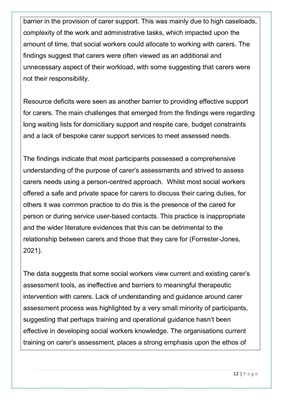
12 | P a g e
barrier in the provision of carer support. This was mainly due to high caseloads,
complexity of the work and administrative tasks, which impacted upon the
amount of time, that social workers could allocate to working with carers. The
findings suggest that carers were often viewed as an additional and
unnecessary aspect of their workload, with some suggesting that carers were
not their responsibility.
Resource deficits were seen as another barrier to providing effective support
for carers. The main challenges that emerged from the findings were regarding
long waiting lists for domiciliary support and respite care, budget constraints
and a lack of bespoke carer support services to meet assessed needs.
The findings indicate that most participants possessed a comprehensive
understanding of the purpose of carer's assessments and strived to assess
carers needs using a person-centred approach. Whilst most social workers
offered a safe and private space for carers to discuss their caring duties, for
others it was common practice to do this is the presence of the cared for
person or during service user-based contacts. This practice is inappropriate
and the wider literature evidences that this can be detrimental to the
relationship between carers and those that they care for (Forrester-Jones,
2021).
The data suggests that some social workers view current and existing carer's
assessment tools, as ineffective and barriers to meaningful therapeutic
intervention with carers. Lack of understanding and guidance around carer
assessment process was highlighted by a very small minority of participants,
suggesting that perhaps training and operational guidance hasn't been
effective in developing social workers knowledge. The organisations current
training on carer's assessment, places a strong emphasis upon the ethos of